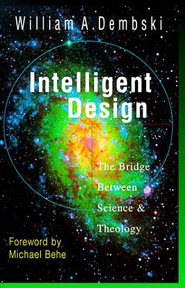Multimedia • Reference • Religion • Travel |
 Intelligent Design: The Bridge Between Science & Theology William A. Dembski with a Forword by Michael J. Behe
Description From The Publisher: God does not play dice with the universe. He plays Scrabble. In the movie Contact, an astronomer played by Jodie Foster discovers a radio signal with a discernable pattern, a sequence representing prime numbers from 2 to 101. Because the pattern is too specifically arranged to be mere random space noise, the scientists infer from this data that an extraterrestrial intelligence has transmitted this signal on purpose. William Dembski sees in this illustration an instance of identifying specified complexity, and he argues that this demonstrates the viability of design theory with his criteria of "specified complexity." Just as the coherent organization of Scrabble tiles on a board indicates arrangement by an intelligent agent, complexity in genetic DNA language and other biological sources suggests design. In the same way that anthropologists, forensic scientists, cryptologists and the Search for Extra-Terrestrial Intelligence (SETI) project use design inferences to identify an intelligently caused event, so too can molecular biologists, geneticists and other scientists reliably infer design. Dembski’s position does not rely on belief in the Genesis account of creation. Rather, he demonstrates that intelligent design operates as a scientific theory of information even without any a priori commitment to Christian theism. The criteria of specified complexity is able to detect design in nature even if the researcher remains agnostic as to the identity of the designing agent. This wide-ranging book argues that intelligent design has more epistemic support and provides greater explanatory power for the origins and development of life than Darwinist evolutionary theory. Dembski demonstrates the weaknesses of methodological naturalism and offers proposals for reinstating design within science. An appendix details Dembski’s responses to common objections to design theory. This book,
Reviews Until recently, the argument for design—that nature (especially living organisms) shows the hand of an intelligent artificer--was generally viewed as an abandoned relic of the pre-Darwinian past. Dembski and his colleagues at the Discovery Institute's Center for the Renewal of Science and Culture have worked over the past decade to rehabilitate the concept of "intelligent design" not only as a plank of natural theology but as a theoretical resource within science. This collection of essays represents Dembski's efforts to remedy the conceptual fuzziness and lack of empirical content that plagued older versions of the design argument. Dembski recasts design as a problem in information theory, of empirically detecting the "complex specified information" that we attribute to intelligent causes. Although design inferences in biology or cosmology are obviously controversial, Dembski aims to normalize them by comparison to similar inferences routinely made in cryptography, forensic science and the search for extraterrestrial intelligence (SETI)--the latter being an especially effective counterexample to the claim that detecting unknown intelligences is impermissible as a scientific project. The book also presents more theologically oriented essays, including an especially astute analysis of the demise of British natural theology and an evocative (if unsympathetic) description of what Dembski sees as the "religious" character of scientific naturalism. Other material interspersed throughout the collection is less clearly related to intelligent design but gives a sense of Dembski's overall theological perspective. Readers who are principally interested in intelligent design itself, or who do not share the authors' theological interests, may find this distracting. —Publisher's Weekly (Nov.) ©1999 Cahners Business Information.
Reader's Index Send us your favorite quotes or passages from this book. About the Author William Dembski holds a Ph.D. in mathematics from the University of Chicago and a Ph.D. in philosophy from the University of Illinois at Chicago. He also has earned degrees in theology and psychology. He is the recipient of two fellowships from the National Science Foundation and currently is a senior fellow of the Discovery Institute’s Center for the Renewal of Science and Culture. He has done postdoctoral work at the University of Chicago, Massachusetts Institute of Technology, Princeton University and Northwestern University. Dembski is the author of the critically acclaimed The Design Inference (Cambridge) and many scholarly articles as well as the editor of Mere Creation. Table of Contents Foreword by Michael Behe Preface Part 1: Historical Beginnings 1. Recognizing the Divine Finger 2. The Critique of Miracles 3. The Demise of British Natural Theology Part 2: A Theory of Design 4. Naturalism & Its Cure 5. Reinstating Design Within Science 6. Intelligent Design as a Theory of Information Part 3: Bridging Science & Theology 7. Science & Theology in Mutual Support 8. The Act of Creation Appendix: Objections to Design Notes Index Customer Reviews Write your own online review. Look for Similar Books by Subject
| |||||||
Copyright ©1996-2011 CenturyOne Bookstore. All Rights Reserved. All prices subject to change and given in U.S. dollars. Your purchase from CenturyOne.com will assist the CenturyOne Foundation in providing funding for various archaeological and research projects which seek to provide more information about the period of the First Century C.E., the origins of Christianity and the world of the Bible in general. All materials contained in http://www.centuryone.com are protected by copyright and trademark laws and may not be used for any purpose whatsoever other than private, non-commercial viewing purposes. Derivative works and other unauthorized copying or use of stills, video footage, text or graphics is expressly prohibited. |

